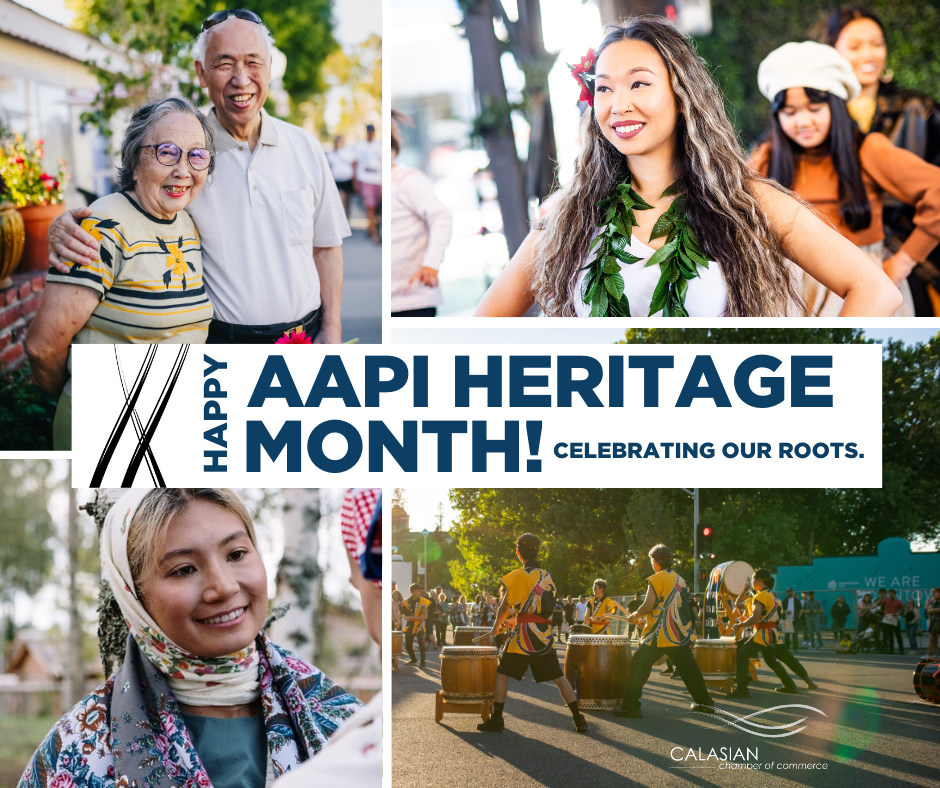Happy AAPI Heritage Month! Let's Learn About It.

Asian American and Pacific Islander (AAPI) Heritage Month is celebrated in May across the U.S. During this month, we celebrate the rich heritage and diversity of AAPI cultures. “AAPI” is a broad term that aims to encapsulate those whose ancestry and cultures come from the Asian continent and Pacific Island regions.
About AAPI Heritage Month
May was chosen to celebrate the AAPI community because it is the same month the first Japanese immigrants arrived in the U.S. in 1843. The month also marks the anniversary of the Transcontinental Railroad completion.
The Transcontinental Railroad construction brought more than 15,000 Asian travelers, most of whom were Chinese. Chinese immigrants made up about 90% of the railroad workers. They were largely employed by the Central Pacific Railroad based out of Sacramento, California, and suffered many forms of oppression such as wrongful imprisonment, unfair wages, and dangerous working conditions. The railroad was completed in 1859.
In 1992, President George H.W. Bush designated May as AAPI Heritage Month to celebrate the accomplishments of people of API descent. However, there are important reminders to consider during this month.
Dr. Sunaina Maira, an Asian American Studies professor at UC Davis, described the purpose of AAPI Heritage month as a month to celebrate diversity, but not just for the sake of diversity.
“Heritage months can become sort of superficial and tokenistic celebrations of difference,” Maira said. “We’re not necessarily thinking about the struggles.”
While AAPI Heritage Month is a chance to celebrate, it’s also an opportunity to learn more about AAPI cultures and the complex history of AAPI groups in the U.S.
How it's celebrated

California’s history is intertwined with amazing stories of AAPI immigrants and their resilience in the face of oppression. Currently in California, there are more than 6 million Asians or people of Asian descent and around 221,000 people of Pacific Island descent. That is about 18% of the total population of California. When we celebrate this month, we are paying tribute to those who paved the way for AAPIs and those who are continuing to build it. Some common celebrations include festivals, sharing AAPI foods, and cultural music and performances.
The AAPI community includes so many diverse and beautiful cultures from the Asian diaspora, all of which should be celebrated and highlighted.
How you can get involved
Although we have made great progress toward inclusivity and equality, many social injustices continue to affect AAPI groups and thus our wider community as a whole.
Due to the rise in hate crimes during the COVID-19 pandemic in 2020, the Stop AAPI Hate campaign was organized to stand up against the vicious verbal and physical attacks many in the AAPI community faced. AAPI hate crimes in the U.S. have existed since the first Asian immigrants arrived. From attacks after 9-11 on West, Southwest, and South Asian groups to red-lined communities that experience decreased funding or gerrymandering, the discrimination and violence is visible throughout U.S. history. There are many resources we can currently use to combat the systemic oppression of people of API descent. You can get involved with some below.
Written by: Sia Patel
Small Business Grants: April 2023

Every small business can use a little extra help with funding, but sometimes it can be difficult to find grant opportunities, especially while taking care of all the responsibilities that running a business requires. To support the search, we’ve compiled a list of five grants to take care of that first step in the process. Check out these current grant opportunities and be sure to apply by their deadline, if listed.
*Last updated: April 20, 2023
1. Restaurants Care Resilience Fund
This grant is for restaurant owners specifically! Independent restaurants can apply for $5,000 grants to support their growth. The deadline to apply is May 7, 2023. Click here to apply.
2. Verizon Small Business Digital Ready
Large corporations like Verizon help small businesses access grants and resources through their Small Business Digital Ready program. The program takes business owners through engaging courses and offers grant funding opportunities for additional support. Apply by May 12, 2023 to be considered. Click here to learn more and apply.
3. Small Business Readiness for Resiliency Program
Readiness for the unexpected is a great way to keep your business safe. With this program from the U.S. Chamber of Commerce, small businesses can apply for $5,000 grants if their business has been impacted by community disasters. Apply by May 31, 2023. Click here to get started.
4. Sales Tax Exclusion (STE) Program
Businesses in California looking to purchase equipment in their manufacturing facilities may be eligible for the STE program. This is an ongoing application process with no listed deadline. Click here to learn more.
5. Mountain Small Business Grant (San Bernardino County)
Businesses affected by the San Bernardino County winter storms are eligible for one-time grants ranging from $3,000 or $15,000 depending on the amount of employees. Applications are open now with no listed deadline. Click here for more information.
Read related articles:
What to Know About Data Privacy
Small Business Grants: February 2023
3 New Laws Small Businesses in California Should Know
5 Museums to Visit to Learn AAPI History

There's so much to learn about the Asian American and Pacific Islander (AAPI) experience that isn't always in our history books. For Museum Advocacy Days on February 27-28, 2023, we encourage you to visit some of California's museums and learn from their exhibits about AAPI history.
Museum Advocacy Days were created to identify and advocate for funding and support from Congress that will benefit museums across the U.S. Find out how to get involved by clicking here.
1. The California Museum
1020 O St.
Sacramento, CA 95814
The California Museum is located in Sacramento. Currently, they have an exhibit called "California is in the Heart," which underlines the critical role Filipino Americans have played in the state's history. The exhibit will be open until April 30, 2023. Explore their website californiamuseum.org.
2. USC Pacific Asia Museum
46 N Los Robles Ave.
Pasadena, CA 91101
Located in Pasadena, the USC Pacific Asian Museum is both a public museum and a teaching and learning resource for the University of Southern California. It aims to create inspiring encounters with the art, history, and culture of Pacific Asia, to promote intercultural understanding. Visit their website pacificasiamuseum.usc.edu.
3. Asian Art Museum of San Francisco
200 Larkin St.
San Francisco, CA 94102
In the heart of San Francisco, the Asian Art Museum has more than 18,000 artworks and is home to one of the world’s finest collections of Asia art. Their mission is to celebrate, preserve, and promote Asian and Asian American art and cultures. Check out their website asianart.org.
4. San Diego Chinese Historical Museum
404 3rd Ave.
San Diego, CA 92101
This museum is located in the heart of San Diego’s downtown Asian Pacific Historic District. Their mission is to create a deeper understanding of China and Chinese America through programs in education, culture, and art in the belief that cross-cultural understanding strengthens the diverse San Diego community. Visit their website sdchm.org.
5. Pacific Island Ethnic Art Museum
695 Alamitos Ave.
Long Beach, CA 90802
In Long Beach, the PIEAM aims to amplify the collective wisdom of the Pacific Islands people of Oceania. This is done through permanent collection, educational opportunities, rotating exhibits, and living arts. The museum’s purpose is to foster intercultural exchanges with appreciation and respect. Explore their website pieam.org.
Read similar articles:
3 New Laws Small Businesses in California Should Know
How to Write to Congress
What to Know During Data Privacy Week
Small Business Grants: February 2023

It's no secret that small business owners face many challenges, and new ones each year. To help businesses get the financial support they need, we've compiled a list of 5 grants that are currently accepting applications.
*Last updated: February 8, 2023
1. Fresh Start Business Grant
Incfile is supporting aspiring entrepreneurs to start or grow their business. One adult entrepreneur will receive $2,500 to put toward business startup costs and will also receive free formation services from Incfile. The deadline to apply is March 31, 2023. Click here for more information.
2. Young Entrepreneur Scholarship Grant
One student with an entrepreneurial spirit will receive $2,500 to continue their education and inspire their entrepreneurship. Deadline to apply is March 31, 2023. Click here for more information.
3. Employability Business Grant
Small or medium-sized businesses in California can apply! Grants are $20,000-$200,000 depending on availability of funding and potential impact of hiring individuals with disabilities. The deadline is December 31, 2023, depending on funding availability. Click here for more information.
4. California Microbusiness COVID-19 Relief Grants
This grant is administered by CalOSBA and provides competitive micro grants of $2,500 to eligible microbusinesses impacted by the COVID-19 pandemic. Find your county contact using the link below. Application deadlines may vary. To find your count contact, click here.
5. California Paid Family Small Business Grant
This grant provides funds for California small businesses to offset the costs incurred when training employees to cover the duties of an individual utilizing Paid Family Leave. Amounts are $1,000-$2,000 based on number of employees. Click here for more information.
Read related articles:
3 New Laws Small Businesses in California Should Know
What to Know About Data Privacy
12 Small Business Resources You Should Know About
What to Know During Data Privacy Week

January 22-28 is Data Privacy Week! This week was created to increase awareness about privacy protection and to spread useful information every tech user should know. Keep reading to learn why data privacy is so important, and how you can help your communities and small businesses be prepared.
How does data privacy affect small businesses?
The most significant risk of not securing your business's or company's data is losing credibility among your clients and customers. Even if a data breach occurs and doesn't impact a specific customer, there is still the possibility that they will have less trust in your organization. It is critical to protect your customers' sensitive information in order to provide a sense of comfort and confidence in your business. Businesses are ethically, morally, and legally obligated to protect consumer information.
You can view this Small Business Guide to Data Protection to learn more, or search for additional resources.
Digital barriers impact AAPI communities.
In California during the fall of 2020, 26% of K–12 students and almost 40% of low-income students reported they still did not have access to reliable internet, according to a Public Policy Institute of California Statewide Survey. Racial and ethnic gaps also exist in the digital divide, with Asian households being 7.6 percentage points less likely than white households to report having internet access.
There is another element to the challenge of connecting AAPI communities with digital skills. Although efforts exist to cultivate digital literacy among AAPI populations, approximately 34% of these individuals have limited English proficiency (LEP). According to data from Asian Americans Advancing Justice in 2015, only 56% of San Francisco Chinatown residents had internet access in their homes. In contrast, the San Francisco city-wide average was 88%.
Income plays a role in the digital divide.
Digital divide indicators like limited English proficiency and income suggest that AAPI communities across the U.S. may be struggling to gain internet access or expand their digital literacy. Pew Research Center reported that 44% of adults with household incomes less than $30,000 do not have broadband. Within the same studies, it is suggested that 12 out of 19 Asian origin groups show poverty rates as high as the U.S. average. Naturally, cost plays a crucial role in gaining internet connectivity, and the poverty rates among the AAPI community likely tie directly to the challenge of gaining internet access in many cases.
Links to learn more:
The First National Strategy to Uplift AA and NHPI communities
How Internet Connectivity Play a Role in Election Season
AT&T is Bridging the Digital Divide for AAPIs
Read similar articles:
3 New Laws Small Businesses in California Should Know
What You Can Do on National Write to Congress Day
4 Questions About Climate Change in California





